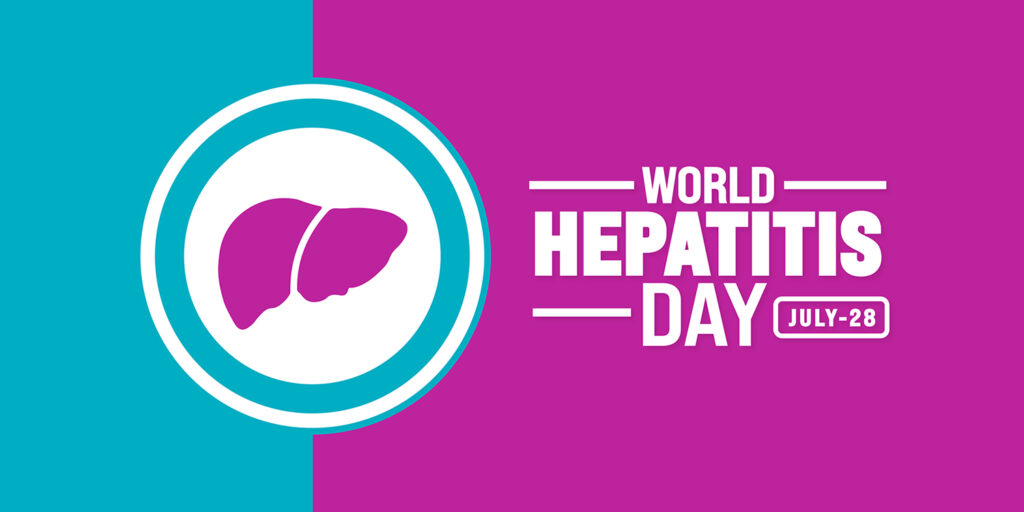World Hepatitis Day 2025: Understanding Hepatitis and the Need for Early Detection

Liver health plays a critical role in overall well-being, yet conditions such as hepatitis often remain overlooked until complications arise. A major global health concern, hepatitis affects individuals of all ages and backgrounds, often without any warning signs, highlighting the need for increasing public awareness, to ensure timely diagnosis and optimal treatment outcomes. World Hepatitis Day aims to bring these issues to light and encourage proactive health screening. Shedding more light on this life-threatening disorder, in this article, we’ll discuss the significance of World Hepatitis Day 2025, the types and symptoms of hepatitis, preventive measures, screening options, and how expert care at Graphic Era Hospital can make a difference. Let’s begin.
Table of Contents
ToggleWorld Hepatitis Day 2025: Why It Matters
World Hepatitis Day is observed every year on 28th July to raise awareness about viral hepatitis and its impact on public health. The date marks the birth anniversary of Dr Baruch Blumberg, the Nobel Prize-winning scientist who discovered the Hepatitis B virus and developed the first vaccine against it – a breakthrough that has saved millions of lives.
Recognised by the World Health Organization, World Hepatitis Day serves as a reminder of the need for universal access to hepatitis prevention, testing, and treatment. With millions affected worldwide and many unaware of their infection, hepatitis continues to pose a major health burden, often progressing silently until serious liver damage has occurred. World Hepatitis Day plays a vital role in pushing for stronger healthcare policies, promoting early diagnosis, and reducing the stigma associated with hepatitis infections.
World Hepatitis Day 2025 Theme: Hepatitis: Let’s Break It Down
The theme for World Hepatitis Day 2025 is “Hepatitis: Let’s Break It Down.” This call to action highlights the urgent need to dismantle the financial, social, and systemic barriers that hinder progress towards hepatitis elimination and liver cancer prevention.
Despite being preventable, treatable, and, especially in the case of hepatitis C, even curable, chronic hepatitis B and C continue to silently damage the liver and lead to serious complications. The theme encourages countries to simplify, scale up, and integrate essential hepatitis services such as vaccination, safe injection practices, harm reduction, testing, and treatment within national health systems.
By focusing on accessibility, integration, and public awareness, the 2025 campaign reminds us that urgent, inclusive action is needed now to end hepatitis as a public health threat by 2030.
What is Hepatitis?
Hepatitis refers to inflammation of the liver, a vital organ responsible for detoxification, metabolism and energy storage. This inflammation can be caused by a variety of factors, including viral infections, alcohol consumption, autoimmune disorders, and certain medications when used inappropriately. Among these, viral hepatitis, caused by five main viruses (Hepatitis A, B, C, D, and E), is the most widespread and concerning from a public health perspective.
Hepatitis can be acute (short-term) or chronic (long-term). While some acute forms of hepatitis may resolve on their own or with minimal treatment, chronic hepatitis can progress silently over the years, leading to severe complications such as liver cirrhosis, liver failure, or liver cancer. The silent nature of many hepatitis infections means that individuals may live for years without symptoms, making early screening and diagnosis essential.
Read More: Liver Health and Disease Prevention
Types of Hepatitis and their Causes
There are five main types of viral hepatitis – A, B, C, D, and E – each caused by a different virus and transmitted through different routes. Understanding how each type spreads is key to preventing infection and managing liver health.
Hepatitis A (HAV)
Transmitted through contaminated food or water, hepatitis A causes short-term illness and usually resolves without long-term liver damage. It is more common in areas with poor sanitation.
Hepatitis B (HBV)
Spread through contact with infected blood, unprotected sex, or from mother to child during childbirth, hepatitis B can become chronic and lead to serious liver complications. It is preventable through vaccination.
Hepatitis C (HCV)
Primarily spread through blood-to-blood contact, often via unsafe injections or transfusions and from mother to child during childbirth. Hepatitis C is a leading cause of chronic liver disease but can now be completely cured with current antiviral treatment.
Hepatitis D (HDV)
Occurs in association with the individuals already infected with hepatitis B or along with hepatitis B as it needs the HBV virus to survive. Co-infection can accelerate liver damage.
Hepatitis E (HEV)
Similar to hepatitis A, it is transmitted through contaminated water and is usually acute (short term) and self-limiting. However, it can be very severe in pregnant individuals and those with compromised immunity.
In addition to these viral hepatitis, hepatitis can also result from autoimmune conditions, alcohol abuse, or prolonged use of certain medications. Identifying the type and cause of hepatitis is essential for targeted treatment and long-term liver protection.
Symptoms of Hepatitis
Hepatitis can be tricky to identify in its early stages because many people do not experience noticeable symptoms until the liver is significantly affected. When symptoms do appear, they can vary depending on the type and severity of the infection.
Common signs of hepatitis may include:
- Fatigue and weakness
- Loss of appetite
- Nausea or vomiting
- Abdominal discomfort, especially in the upper right side
- Dark urine and pale stools
- Yellowing of the skin and eyes (jaundice)
In chronic cases, the disease can silently damage the liver over time without producing obvious symptoms. Left untreated, chronic hepatitis, especially hepatitis B and C, can progress to cirrhosis, liver failure, or liver cancer.
Because these symptoms are often mistaken for other conditions, timely testing becomes essential, particularly for individuals with risk factors or known exposure. Early diagnosis not only improves outcomes but can also prevent the spread of infection.
Hepatitis in Children: Why Early Detection Matters
Children can contract hepatitis through various routes, including mother-to-child transmission, contaminated food or water, and unscreened blood transfusions. While some forms, such as hepatitis A or E, are usually self-limiting, hepatitis B and C can become chronic in children and quietly harm the liver over time.
Many paediatric cases remain asymptomatic in the early stages, which makes routine screening and timely vaccination crucial. If undetected, chronic hepatitis in children can lead to liver damage at a much younger age, impacting growth, immunity, and overall health.
Early detection allows for monitoring, preventive care, and in some cases, antiviral treatment. It also helps reduce the risk of transmission within households and schools. Raising awareness about hepatitis in children ensures that parents, schools, and healthcare providers stay vigilant, especially in regions with high prevalence.
How Hepatitis Affects Long-Term Liver Health
Chronic viral hepatitis, especially types B and C, can silently damage the liver over time. Without early detection and treatment, it may lead to serious, life-threatening complications, such as:
- Liver cirrhosis: Long-term inflammation causes scarring (fibrosis), which disrupts liver structure and function.
- Liver failure: As liver damage progresses, the organ loses its ability to filter toxins, process nutrients, and produce essential proteins.
- Liver cancer (hepatocellular carcinoma): Chronic hepatitis significantly increases the risk of developing primary liver cancer.
- Portal hypertension: Scarred liver tissue can obstruct blood flow, leading to increased pressure in the portal vein and related complications.
- Need for liver transplant: Advanced cases may require a transplant when medical management is no longer effective.
Preventive care and regular liver screening tests can help monitor disease progression. With timely antiviral therapy and expert management, it’s possible to reduce the risk of these outcomes and preserve long-term liver function.
How to Prevent Hepatitis
Prevention is the most effective strategy against hepatitis, especially given how easily some forms can spread and how silently chronic infections can progress. With the right measures, most cases of viral hepatitis can be avoided.
- Safe food and water practices: To prevent hepatitis A and E, consume clean drinking water, practise good hand hygiene, and avoid food from unhygienic sources.
- Vaccination: Safe and effective vaccines are available for hepatitis A and B. These are especially important for children, healthcare workers, and individuals with chronic illnesses.
- Use sterile medical equipment: Ensure injections, dental treatments, and surgical procedures are done with sterilised tools to prevent hepatitis B, C, and D.
- Safe blood transfusions: Always verify that blood used in transfusions is properly screened for hepatitis viruses.
- Practice safe sex: Use protection and get tested regularly to reduce the risk of hepatitis B and C transmission.
- Avoid sharing personal items: Items such as razors, toothbrushes, and nail cutters can carry infected blood and should not be shared.
- Promote awareness and regular testing: Early diagnosis through screening, especially for high-risk individuals, helps prevent long-term complications and limits the spread.
Hepatitis Screening and Diagnosis
Early diagnosis is key to managing hepatitis effectively and preventing long-term liver damage. Since many people with hepatitis, especially types B and C, may not show symptoms for years, routine screening is recommended for at-risk groups.
Common diagnostic methods include:
- Blood tests: These can detect hepatitis viruses, assess liver enzyme levels, and differentiate between acute and chronic infections.
- HBsAg and Anti-HCV tests: Used to screen for hepatitis B and C respectively, especially among high-risk populations.
- Liver function tests (LFTs): Help assess the extent of liver damage by measuring enzymes and proteins produced by the liver.
- Ultrasound and imaging: May be used to detect liver enlargement, fibrosis, or signs of cirrhosis.
- Liver biopsy or elastography: In select cases, these help determine the degree of scarring or inflammation in the liver tissue.
Screening is especially important for:
- Individuals born to hepatitis-infected mothers
- People who received blood transfusions before routine screening became standard
- Individuals with symptoms of jaundice or unexplained fatigue
- Those undergoing liver screening tests or treatment for chronic conditions
Detecting hepatitis early enables timely medical intervention, monitoring, and access to antiviral therapies that can prevent complications and transmission.
Why Choose Graphic Era Hospital for Liver and Hepatitis Care
At Graphic Era Hospital, liver care is not just about managing disease, it’s about preserving quality of life through personalised, expert-led treatment. The hospital brings together a team of skilled specialists, advanced diagnostics, and compassionate care to support patients at every stage of hepatitis management. We offer:
- Expert Care: The hospital is home to experienced liver specialists in Dehradun who are trained in treating all forms of viral hepatitis, including complex and chronic cases. Individualised care plans are designed based on the type and stage of infection.
- Excellence and Cutting-Edge Technology: From high-precision liver screening tests to imaging, elastography, and biopsy-guided diagnosis, the hospital is equipped with state-of-the-art tools to support timely and accurate treatment decisions.
- Trust and Patient-Centred Care: At Graphic Era Hospital, patient comfort and education are prioritised. Whether it’s managing hepatitis B or monitoring long-term complications, patients receive guidance every step of the way, including referrals for specialised services such as infectious disease care and liver transplant evaluation when required.
With a focus on early diagnosis, integrated care, and long-term liver health, Graphic Era Hospital offers a trusted destination for hepatitis management and recovery.
Spreading Hepatitis Awareness This World Hepatitis Day
Raising awareness is one of the most effective tools in the fight against hepatitis. World Hepatitis Day is an opportunity for individuals, healthcare providers, and organisations to come together and spark conversations that save lives.
Here are some ways to support the cause and promote awareness:
- Encouraging testing: Motivating friends, family, and colleagues, especially those at risk, to get screened for hepatitis.
- Sharing educational content: Using digital platforms to spread reliable information about hepatitis prevention, symptoms, and treatment.
- Supporting vaccination drives: Participating in or promoting community-based immunisation efforts, particularly for hepatitis A and B.
- Breaking the stigma: Talking openly about hepatitis helps reduce fear and shame, making it easier for affected individuals to seek timely care.
- Partnering with healthcare providers: Collaborating on public health campaigns, outreach events, or school-based education programmes.
- Using impactful quotes in awareness posts:
- “Know hepatitis, act now.”
- “Get tested, get treated, save lives.”
- “Hepatitis is silent: don’t let it stay hidden.”
- “One test can protect your liver for life.”
Even small actions, such as starting a conversation or sharing a social media post, can have a lasting impact. Together, communities can work towards early diagnosis, prevention, and elimination of hepatitis as a public health concern.
Taking Action Against Hepatitis: Every Step Counts
Hepatitis may be silent, but the damage it causes can be life-altering. The path to prevention and recovery begins with a simple step: awareness. With safe practices, timely testing, and accessible treatment, hepatitis is a preventable and manageable condition.
Graphic Era Hospital encourages individuals, families, and communities to prioritise liver health, stay informed about hepatitis risk factors, and undergo screening when needed. Whether it’s getting vaccinated, encouraging a loved one to consult a specialist, or participating in awareness drives, every action, no matter how small, can help move closer to a hepatitis-free future.
To consult a liver specialist or book your hepatitis screening tests at Graphic Era Hospital, call 1-800-889-7351.
Frequently Asked Questions
What are the early hepatitis symptoms to watch out for?
Early symptoms of hepatitis may include fatigue, nausea, dark urine, pale stools, abdominal discomfort, and yellowing of the eyes or skin. These signs are often mistaken for other conditions, so timely testing is important.
How many types of hepatitis are there and how do they differ?
There are five main types: Hepatitis A, B, C, D, and E. They differ in mode of transmission, severity, and duration. For instance, hepatitis A and E are spread through contaminated food or water, while hepatitis B and C are bloodborne and may become chronic.
What causes viral hepatitis and how can it be prevented?
Viral hepatitis is caused by specific viruses (HAV, HBV, HCV, HDV, HEV) and can be spread through contaminated water, unsafe injections, sexual contact, or from mother to child. Prevention includes vaccination, hygiene, safe medical practices, and regular testing.
Can children get hepatitis, and is it different from adult hepatitis?
Yes, hepatitis in children can be acquired at birth or through exposure to contaminated water or blood. Chronic forms such as hepatitis B and C can remain undetected in children and cause long-term liver issues if not diagnosed early.
How does chronic viral hepatitis affect liver health in the long run?
Chronic hepatitis B and C can lead to liver inflammation, cirrhosis, liver cancer, and the need for a liver transplant. Early detection and treatment are essential to preserve long-term liver health.
Where can I find a liver specialist near me for hepatitis care?
Graphic Era Hospital offers expert consultation with liver specialists in Dehradun. They provide comprehensive care for all types of hepatitis, including advanced diagnostics and long-term monitoring.
Are there any recommended liver screening tests for hepatitis?
Yes, common tests include liver function tests (LFTs), hepatitis B surface antigen (HBsAg), anti-HCV antibody, and ultrasound. These help in diagnosing infection, monitoring damage, and guiding treatment.
What is the significance of World Hepatitis Day and how can I participate?
World Hepatitis Day raises awareness about hepatitis prevention and encourages early testing. Individuals can participate by sharing educational resources, promoting vaccination, or organising community awareness drives.
Can you share some World Hepatitis Day quotes for awareness posts?
Certainly. Here are a few:
- “Know hepatitis, act now.”
- “Get tested, get treated, save lives.”
- “Hepatitis is silent—don’t let it stay hidden.”
- “One test can protect your liver for life.”
By Specialities
- Bariatric Surgery
- Cancer Care
- Cardiology
- Dental
- Dermatology
- Diabetes & Endocrinology
- Endocrinology and Diabetes
- ENT (Ear Nose Throat)
- Eye Care
- Gastroenterology
- Haematology
- Health Awareness
- Health Care
- Health Tips
- Hematology
- Hepatology
- Internal Medicine
- Mental Health and Behavioural Sciences
- Metabolic
- Neonatology
- Nephrology
- Neurology
- Nutrition & Dietetics
- Obstetrics & Gynaecology
- Oncology
- Ophthalmology
- Orthopaedics
- Paediatric
- Physiotherapy & Rehabilitation
- Plastic and Reconstructive Surgery
- Psychology
- Pulmonology
- Rheumatology
- Spine
- Urology
Recent Posts
- A Complete Guide to Blood Clots in the Brain
- Heart Attack: Symptoms and Treatment
- World Obesity Day 2026: Understanding, Preventing, and Managing Obesity
- Bacterial and Viral Pneumonia: Causes, Symptoms, and Treatment Options
- World Hearing Day 2026: Empower Yourself to Protect and Improve Your Hearing
Need expert medical advice?
Share your details and our healthcare specialists will reach out to assist you.
By proceeding, you acknowledge and agree to our Privacy Policy, Terms of Use, and Disclaimer.



















